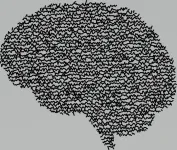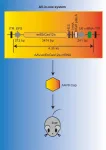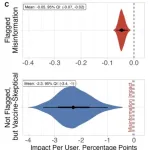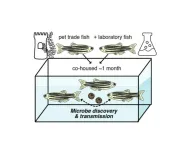(Press-News.org) Humans may be accelerating the rate at which organic matter decomposes in rivers and streams on a global scale, according to a new study from the University of Georgia, Oakland University and Kent State University.
That could pose a threat to biodiversity in waterways around the world and increase the amount of carbon in Earth’s atmosphere, potentially exacerbating climate change.
Published in Science, the study is the first to combine a global experiment and predictive modeling to illustrate how human impacts to waterways may contribute to the global climate crisis.
“Everyone in the world needs water,” said Krista Capps, co-author of the study and an associate professor in UGA’s Odum School of Ecology and Savannah River Ecology Laboratory. “When human activities change the fundamental ways rivers work, it’s concerning. Increases in decomposition rates may be problematic for the global carbon cycle and for animals, like insects and fish, that live in streams because the food resources they need to survive will disappear more quickly, lost to the atmosphere as carbon dioxide.”
Global warming, urbanization, increased nutrients altering global carbon cycle
Rivers and streams play a key role in the global carbon cycle by storing and decomposing large amounts of leaves, branches and other plant matter.
Typically, the process would go something like this: Leaf falls into river. Bacteria and fungi colonize the leaf. An insect eats the bacteria and fungi, using the carbon stored in the leaf to grow and make more insects. A fish eats the insect.
The study found that this process is changing in areas of the world impacted by humans.
Rivers impacted by urbanization and agriculture are changing how quickly leaf litter decomposes.
And when the process speeds up, that insect doesn’t have a chance to absorb the carbon from the leaf. Instead, the carbon is released into the atmosphere, contributing to greenhouse gas pollution and ultimately disrupting the food chain.
“When we think of greenhouse gas emissions, we tend to think of tailpipes and factories,” said Scott Tiegs, co-author of the study and a professor of biological sciences at Oakland. “But a lot of carbon dioxide and methane comes from aquatic ecosystems. This process is natural. But when humans add nutrient pollution like fertilizer to fresh waters and elevate water temperatures, we increase the decomposition rates and direct more CO2 into the atmosphere.”
Reducing human impact could improve water quality, help fight climate change
The researchers collected field data from 550 rivers across the globe, collaborating with more than 150 researchers in 40 countries.
Based on that data, the scientists generated one of the first estimates of decomposition rates in rivers and streams throughout the world, including understudied areas such as the tropics.
The authors compiled the data into a free online mapping tool that shows how fast different kinds of leaves decompose in local waterways.
Using predictive modeling, the researchers also identified environmental factors responsible for increased decomposition rates, such as higher temperatures and increased nutrient concentrations.
“Both of these factors are impacted by human activities,” said David Costello, co-author of the study and an associate professor at Kent State. “Reducing human impacts on decomposition will keep more carbon in rivers, preventing it from entering the atmosphere as carbon dioxide and contributing to climate change.”
The study was co-authored by John Paul Schmidt, from UGA’s Odum School of Ecology; Christopher J. Patrick, Virginia Institute of Marine Science; Jennifer J. Follstad Shah, University of Utah; Carrie J. LeRoy, The Evergreen State College; and the CELLDEX Consortium.
END
People are altering decomposition rates in waterways
Faster decomposition could exacerbate greenhouse gas emissions, threaten biodiversity
2024-05-30
ELSE PRESS RELEASES FROM THIS DATE:
Studied on social media: The real-world impacts of factual but misleading content & the characteristics of “supersharers”
2024-05-30
Factual yet misleading vaccine content was 46 times more effective at driving vaccine hesitancy than flagged misinformation, reports a new study exploring real-world impacts of misinformation exposure. A second study aiming to better understand the characteristics of “supersharers” – a small group of individuals increasingly found to spread misinformation – reports that just over 2,000 supersharers on X (formally Twitter) spread 80% of the fake news during the 2020 US presidential election; the study involved a sample of more than 660,000 voters on X and uncovered that the supersharers were mainly middle-aged Republican women in conservative states.
Misinformation, ...
Why some nest-invading cuckoo birds have higher rates of speciation
2024-05-30
Cuckoos – which lay their eggs in nests of other birds – have higher speciation rates when they lay their eggs in a broader range of host bird species’ nests, a new study reports. This higher speciation rate is driven by host rejection and cuckoo selection for mimetic nestling traits. How new species arise is a fundamental question in biology. Coevolution between closely interacting species is thought to increase biodiversity and potentially explain the vast number of distinctly specialized species. However, evidence linking macroevolutionary patterns to microevolutionary ...
Living bioelectronic device monitors and manages psoriasis in mice
2024-05-30
Coupling skin bacteria-laden hydrogel and electronics, researchers have introduced the ABLE platform, a bioelectronics system that can deliver management and adaptive treatment of skin inflammation. They test this approach in a mouse model of psoriasis. The findings demonstrate the potential for clinical application of bioelectronics devices that promote drug-free therapeutic effects through a living hydrogel interface. “This amalgamation of living and synthetic components is a notable advance toward ...
Model reveals global patterns of organic decomposition in rivers
2024-05-30
Integrating big data and a coordinated global field experiment, researchers have developed a model that can predict the decomposition rate of organic matter in rivers worldwide. The global model estimates decomposition rates in rivers across vast understudied areas of Earth, revealing rapid decomposition across continental-scale areas dominated by human activities. Earth's terrestrial ecosystems generate over 100 billion tons of plant detritus annually, with its fate – long-term storage, mineralization to greenhouse gasses, or incorporation into food webs – determined by decomposition rates. This organic material is continually added to rivers ...
Is your coffee ‘not hot’ or ‘cold’? Observing how the brain processes negated adjectives
2024-05-30
Negating an adjective by placing ‘not’ in front of it affects the way our brains interpret its meaning, mitigating but not entirely inverting our interpretation of its definition. In a study published May 23rd in the open-access journal PLOS Biology, Arianna Zuanazzi at New York University, US, and colleagues offer insight into how the brain represents changes of meaning over time and offer new methods for further linguistic research.
The way the brain processes negated adjectives — ‘not bad’ or ‘not ...
New, modified CRISPR protein can fit inside virus used for gene therapy
2024-05-30
Researchers have developed a novel version of a key CRISPR gene-editing protein that shows efficient editing activity and is small enough to be packaged within a non-pathogenic virus that can deliver it to target cells. Hongjian Wang and colleagues at Wuhan University, China, present these findings May 23rd in the open-access journal PLOS Biology.
Recent years have seen an explosion of research attempting to harness CRISPR gene-editing systems—which are found naturally in many bacteria as a defense against viruses—so they can be used as potential treatments for human disease. These systems rely on so-called CRISPR-associated (Cas) proteins, with Cas9 and Cas12a being ...
Misleading COVID-19 headlines from mainstream sources did more harm on Facebook than fake news
2024-05-30
CAMBRIDGE, Mass., May 30, 2024 – Since the rollout of the COVID-19 vaccine in 2021, fake news on social media has been widely blamed for low vaccine uptake in the United States — but research by MIT Sloan School of Management PhD candidate Jennifer Allen and Professor David Rand finds that the blame lies elsewhere.
In a new paper published in Science and co-authored by Duncan J. Watts of the University of Pennsylvania, the researchers introduce a new methodology for measuring social media content’s causal impact at scale. They show that misleading content from mainstream news sources — rather than outright misinformation or “fake news” ...
Historic iceberg surges offer insights on modern climate change
2024-05-30
(Santa Barbara, Calif.) — A great armada entered the North Atlantic, launched from the cold shores of North America. But rather than ships off to war, this force was a fleet of icebergs. And the havoc it wrought was to the ocean current itself.
This scene describes a Heinrich Event, or a period of rapid iceberg discharge from the Laurentide Ice Sheet during the last glacial maximum. These episodes greatly weakened the system of ocean currents that circulates water within the Atlantic Ocean. The Atlantic Meridional Overturning Circulation, or AMOC for short, brings warm surface water ...
Reexamining misinformation: How unflagged, factual content drives vaccine hesitancy
2024-05-30
What threatens public health more, a deliberately false Facebook post about tracking microchips in the COVID-19 vaccine that is flagged as misinformation, or an unflagged, factual article about the rare case of a young, healthy person who died after receiving the vaccine?
According to Duncan J. Watts, Stevens University Professor in Computer and Information Science at Penn Engineering and Director of the Computational Social Science (CSS) Lab, along with David G. Rand, Erwin H. Schell Professor at MIT Sloan School of Management, and Jennifer Allen, 2024 MIT Sloan School of Management Ph.D. graduate ...
Novel virus identified in zebrafish from the pet trade causes disease in laboratory fish
2024-05-30
Zebrafish in the pet trade are asymptomatic carriers of previously undescribed microbes, including a novel virus that causes hemorrhaging in infected laboratory fish, Marlen Rice from the University of Utah, US, and colleagues report in the open-access journal PLOS Biology, publishing May 23rd.
Zebrafish (Danio rerio) are a common laboratory research animal, and they are also widely available as pets. In research laboratories, they are kept in specialized aquaculture facilities to prevent infectious disease, but zebrafish are occasionally ...
LAST 30 PRESS RELEASES:
Under the Lens: Microbiologists Nicola Holden and Gil Domingue weigh in on the raw milk debate
Science reveals why you can’t resist a snack – even when you’re full
Kidney cancer study finds belzutifan plus pembrolizumab post-surgery helps patients at high risk for relapse stay cancer-free longer
Alkali cation effects in electrochemical carbon dioxide reduction
Test platforms for charging wireless cars now fit on a bench
$3 million NIH grant funds national study of Medicare Advantage’s benefit expansion into social supports
Amplified Sciences achieves CAP accreditation for cutting-edge diagnostic lab
Fred Hutch announces 12 recipients of the annual Harold M. Weintraub Graduate Student Award
Native forest litter helps rebuild soil life in post-mining landscapes
Mountain soils in arid regions may emit more greenhouse gas as climate shifts, new study finds
Pairing biochar with other soil amendments could unlock stronger gains in soil health
Why do we get a skip in our step when we’re happy? Thank dopamine
UC Irvine scientists uncover cellular mechanism behind muscle repair
Platform to map living brain noninvasively takes next big step
Stress-testing the Cascadia Subduction Zone reveals variability that could impact how earthquakes spread
We may be underestimating the true carbon cost of northern wildfires
Blood test predicts which bladder cancer patients may safely skip surgery
Kennesaw State's Vijay Anand honored as National Academy of Inventors Senior Member
Recovery from whaling reveals the role of age in Humpback reproduction
Can the canny tick help prevent disease like MS and cancer?
Newcomer children show lower rates of emergency department use for non‑urgent conditions, study finds
Cognitive and neuropsychiatric function in former American football players
From trash to climate tech: rubber gloves find new life as carbon capturers materials
A step towards needed treatments for hantaviruses in new molecular map
Boys are more motivated, while girls are more compassionate?
Study identifies opposing roles for IL6 and IL6R in long-term mortality
AI accurately spots medical disorder from privacy-conscious hand images
Transient Pauli blocking for broadband ultrafast optical switching
Political polarization can spur CO2 emissions, stymie climate action
Researchers develop new strategy for improving inverted perovskite solar cells
[Press-News.org] People are altering decomposition rates in waterwaysFaster decomposition could exacerbate greenhouse gas emissions, threaten biodiversity




